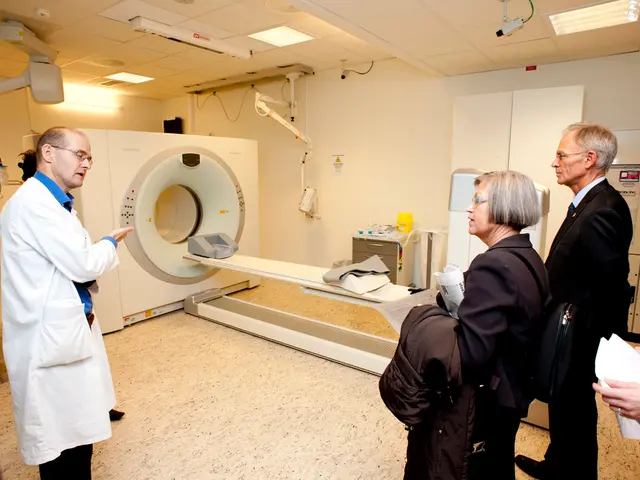Possible surge of millions of measles cases in the U.S. over the upcoming quarter-century due to decreased vaccination rates.
Measles outbreaks could spell trouble for the USA, according to a new report published by JAMA. In a worst-case scenario, a 50% drop in childhood vaccinations could result in a staggering 51.2 million measles cases over the next 25 years. This bleak landscape comes amidst a concerning rise in vaccine denial, with anti-vaccine sentiments permeating governmental spheres and a large chunk of the populace remaining oblivious to the grave danger posed by measles.
Researchers from Stanford University simulated the effects of varying vaccination rates on measles, rubella, poliomyelitis, and diphtheria. The simulation paints a grim picture: a 50% drop in childhood immunizations would lead to 9.9 million cases of rubella, 4.3 million cases of poliomyelitis, and 197 cases of diphtheria, resulting in 10.3 million hospitalizations and 159,200 deaths.
On the flip side, maintaining vaccination rates from 2025 would still see over 850,000 cases in the U.S. Even a seemingly minor 10% drop in MMR immunization rates could cause a steep increase in measles infections, with 11.1 million cases in the U.S. over the next 25 years. In contrast, a 5% rise in vaccinations could mean the U.S. would witness just 5,800 cases. A herd immunity threshold of 95% for measles requires a vaccination rate of roughly 95%. The researchers predict current vaccination rates to be between 87.7% and 95.6%.
State vaccination rates vary. New York, for instance, boasted an estimated childhood vaccination rate of 97.7% for the 2023-24 school year, according to the CDC. In stark contrast, Idaho reported a rate of merely 79.6%.
Before the introduction of the measles vaccine in 1963, around 3-4 million Americans contracted measles each year, with tens of thousands hospitalized, and nearly 500 deaths annually, according to CDC records. Worse still, measles triggers what's known as "immune amnesia," weakening the immune system and making the body vulnerable to other infections.
Unfortunately, the U.S. is currently grappling with its worst measles outbreak in a quarter century, with 800 confirmed cases across 25 states. Illinois reported its first confirmed case on Thursday, and three people have died from the disease this year, including two children in Texas and an adult in New Mexico.
What's alarming is the discussions and beliefs surrounding the outbreak. The parents of a 6-year-old girl who passed away from measles criticized their decision not to vaccinate their daughter, citing four healthy unvaccinated siblings as proof they didn't regret their choices. The father of an 8-year-old girl who died in April argued against vaccination, claiming that her death was unrelated to measles and poor hospital care.
These families align with Children's Health Defense, an anti-vaccine group claiming that vaccines cause autism. Robert F. Kennedy Jr., who served as the chair of that organization from 2015 until 2023, is now the head of the Department of Health and Human Services, casting a dim light on the future of vaccination rates.
Kennedy has been working on a massive database, collecting private health records from Americans, and his latest endeavor is to uncover the "cause" of autism, claiming it to be an "epidemic" akin to the one he fought against during his time with Children's Health Defense. In addition to his autism crusade, Kennedy has been vocal about dwindling testosterone levels in American boys, questioning the rise of various learning disorders, and even insinuating that some diseases didn't exist when he was a child.
It's essential to note that Kennedy's aunt, Rosemary Kennedy, was institutionalized and lobotomized due to what were then viewed as mental health issues, but could potentially be attributed to undiagnosed learning disabilities or autism. This family history might shed some light on the struggles faced by those with these conditions in the past, and Kennedy's misguided response could have dire consequences for the future.
In conclusion, the projected outcomes for measles cases, hospitalizations, and deaths under different vaccination scenarios are dire. Rising anti-science sentiments in government paired with an uninformed public could lead to catastrophic consequences, exacerbated by a lack of action from politicians like Robert F. Kennedy Jr. and a president who has shown little regard for science and public health.
- The future of science and technology, particularly in the health sector, hangs in the balance as concerns over vaccine denial escalate.
- In light of this, the World Health Organization (WHO) has highlighted the importance of supporting vaccination efforts to prevent outbreaks of preventable diseases.
- The rise in technological advancements and artificial intelligence (AI) could revolutionize the field of medical-conditions research, providing new insights into treatments for chronic diseases like cancer and respiratory conditions.
- In relation to this, the digitalization of healthcare through telemedicine and smart health apps is poised to improve access to healthcare services, especially in remote areas.
- On a parallel note, the progress in biotechnology is opening up avenues for the treatment of various digestive health issues, eye health concerns, and hearing problems.
- Furthermore, the ongoing research and development in pharmaceuticals could lead to breakthroughs in the manufacture of alternative therapies for mental health disorders, such as anxiety and depression.
- Moreover, the rise of CBD-based products in the retail sector has sparked interest in exploring its potential benefits for neurological disorders, like migraines and epilepsy.
- As we look to the future, the role of finance in health and wellness cannot be overstated, as investments in research and development drive innovation in the industry.
- In the realm of energy efficiency, focus is increasing on the impact of energy consumption in healthcare settings to reduce costs and minimize environmental footprints.
- After a recent snowstorm, public transit systems temporarily halted, affecting the daily commutes of countless citizens and showcasing the importance of having a reliable transportation infrastructure.
- Entrepreneurship and transportation have a symbiotic relationship, with emerging transport startups disrupting traditional industries and creating new business opportunities.
- In line with this, the automotive industry is developing electric and self-driving vehicles to address environmental concerns and improve safety on our roads.
- Consequently, the growth of the automotive sector could bolster job creation and pave the way for innovative advancements in areas like cybersecurity and smart cities.
- As technology continues to advance, there is a growing need for strong leadership in all sectors, especially in the face of complexity and uncertainty.
- Companies such as Apple, Microsoft, and Google have embraced diversity and inclusion initiatives to foster innovation and attract a broader talent pool.
- Wearables and smart home devices have become ubiquitous, offering various health benefits and integrating seamlessly into modern lifestyles.
- In an increasingly interconnected world, concerns over data privacy and cybersecurity have risen to the fore, with companies like cybersecurity giant Symantec working tirelessly to protect against cyber threats.
- As we grapple with the consequences of climate change, promoting sustainable practices within the housing market is crucial for building a greener future.
- Greater investment in renewable energy sources like wind and solar power is essential to reduce greenhouse gas emissions and combat global warming.
- In conjunction with this, the aviation sector is working diligently to devise fuel-efficient technologies and embrace electric aircraft to decrease its carbon footprint.
- Careers in the technology sector have soared in recent times, with a wide array of opportunities available, from software development to user experience design.
- The housing market is undergoing immense transformations, with the rise of tiny houses and co-living spaces catering to the needs of a new generation of homeowners and renters.
- Venture capital firms are increasingly awarding funding to startups that focus on solving real-world problems, including those related to personal finance, such as budgeting and debt management.
- The rise of fintech companies has made financial services more accessible, democratizing wealth management and financial literacy.
- Meanwhile, the rise of AI and robotics in the banking and insurance industries is changing the way services are delivered, enhancing usability and efficiency for consumers.
- In the wake of the pandemic, the real-estate industry has experienced a shift, with remote work practices reshaping commercial and residential real estate demands.
- Stock markets continue to fluctuate, with investors closely monitoring market trends and opportunities to make informed decisions about investing and saving for their futures.
- Private equity firms have become instrumental in driving growth and efficiencies in various industries, including small businesses, hospitality, and retail.
- The savings and debt management landscape has evolved, thanks to online platforms offering personalized plans to help individuals achieve financial stability.
- The explosion of new gadgets and smartphones in the consumer electronics market has ushered in an era of sophisticated mobile technology, transforming the ways we work and entertain ourselves.
- In the realm of data and cloud computing, Microsoft, Google, and Amazon have emerged as giants, offering cloud services that revolutionize businesses' operations and productivity.
- Backyard gardening has gained prominence as a hobby, with people taking joy in growing their own fruits and vegetables to improve their diets and reduce their carbon footprint.
- On a broader scale, technology continues to pervade nearly every aspect of our lives, from how we work to how we manage our finances and health, promising an exciting yet unsettling journey into the future.








